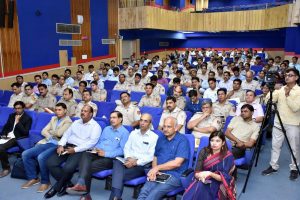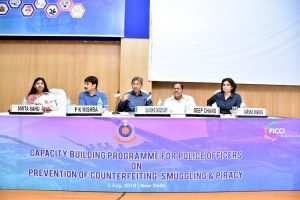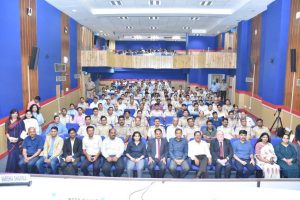DRI busts racket; food, items worth Rs 41.24 lakh smuggled from African countries seized
The Directorate of Revenue Intelligence (DRI) has busted a unique and first of a kind racket of smuggling where food and personal items weighing 10 tonnes were brought to the country without paying the customs duty.
The consignments valued at Rs 41.24 lakh were seized under the customs act.
After receiving specific input on July 19, a sleuth of DRI Hyderabad intercepted five consignments weighing over 10 tonnes at Air Cargo Complex of Rajiv Gandhi International Airport, Hyderabad.
Further verification of the unaccompanied baggage, which originated from African countries Lagos, Nigeria revealed that the goods were declared as edible foods stuff and personal effects and weighed around 10 tonnes. The total value of the consignment declared to customs was around Rs 1.3 lakh and was found to be grossly undervalued.
DRI officers found a variety of items including noodles, cosmetics, palm oil, beef, dried fish, meat, beverages including alcohol such as whiskey, beer, gin, in huge commercial quantities, which are not allowed to be imported as baggage as per Foreign Trade (Development and Regulation) Act,1992 and Customs Act,1962.
Lear More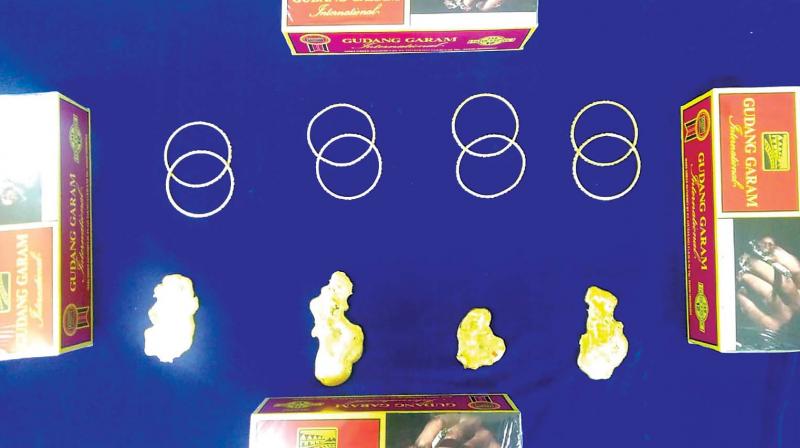
Chennai: Customs seizes gold, foreign cigarettes
During a personal check, gold bangles weighing 390 grams valued at Rs 14 lakh were recovered from her innerwear
On examination of their checked-in luggage, 31 cartons of Gudang Garam cigarettes valued at Rs. 75, 000 were also recovered and seized under the Custom Act, 1962.
Chennai: Customs staff at the airport seized gold and foreign cigarettes worth Rs 97,75,000 on Monday. According to airport sources, Noor Ayesha (39) of Cuddalore who had arrived from Singapore was intercepted on suspicion. During a personal check, gold bangles weighing 390 grams valued at Rs 14 lakh were recovered from her innerwear and seized under the Custom Act, 1962.
In another case on the same day, three passengers, Sheikh Dawood (33) Syed Aputhakir (33) and Sahul Hameed (39) of Ramanathapuram, who had arrived from Dubai by an Air India flight were intercepted, 1 kilogram of gold valued at Rs. 37.8 lakh recovered from them. On examination of their checked-in luggage, 31 cartons of Gudang Garam cigarettes valued at Rs. 75, 000 were also recovered and seized under the Custom Act, 1962. Sources said that Syed Aputhakir was arrested as he had an earlier offence booked against him.
Lear MoreMan smuggles liquor in milk containers, Delhi Police recovers 200 quarters of Haryana alcohol.
South-East Delhi Police has arrested a notorious liquor smuggler Jawar (43). He is a resident of Palwal, Haryana.
He was smuggling liquor in milk containers on his motorcycle. With the arrest of the accused, 200 quarters of Haryana liquor have been recovered.
In July, near Agra Canal at Mithapur in Delhi, a police team was keeping a vigil on motorcycle riders coming from Faridabad, Haryana.
At around 10 pm on July 22, during checking, the police saw a motorcycle rider carrying milk containers. The rider was coming from Faridabad.
The police team got suspicious about the movement of the milkman and signaled the rider to stop. But, the rider instead picked up speed and tried to dodge the checkpost.
However, the police team successfully intercepted the rider. After he was frisked, four milk containers which were hooked on to the motorcycle had 200 quarters of Asli Masaledar Desi Sharab inside.
Lear More
Imported cigarettes worth Rs 1.62 cr seized in West Bengal, Assam; Three Arrested.
DRI personnel had first intercepted a container truck on the outskirts of Siliguri and recovered over 10.43 lakh cigarette sticks worth Rs 1.04 crore.
KOLKATA: The Directorate of Revenue Intelligence (DRI) has seized illegally imported cigarettes worth Rs 1.62 crore from West Bengal and Assam and arrested three persons in this connection, a statement issued by the agency said on Wednesday.
The consignment was smuggled from Myanmar to India through the porous international border in Manipur, it said.
“DRI strikes at multiple locations to bust the syndicate engaged in smuggling of huge quantities of foreign cigarettes.
“A total of 16.27 lakh sticks (cigarettes) have been seized from three different places in Siliguri, Kolkata and Guwahati, cumulatively valued at Rs 1.62 crore. Three persons have been arrested,” the statement said.
Acting on a tip-off, the DRI personnel had first intercepted a container truck on the outskirts of Siliguri on Sunday and recovered over 10.43 lakh cigarette sticks worth Rs 1.04 crore.
Lear More
One arrested for smuggling 225 cartons of liquor in Uttar Pradesh’s Shamli.
The accused was arrested with 225 cartons of liquor from Yamuna bridge on Panipat-Khatima highway.
On Sunday, a large consignment of liquor being smuggled from Haryana was seized from a vehicle at the Yamuna bridge check-post on the interstate border in the neighbouring Shamli district.
A man identified as Naresh Kumar was arrested from Yamuna bridge on Panipat-Khatima highway with 225 cartons of liquor, Kairana Circle Officer (CO) Rajesh Kumar said. A case against the accused has been registered, Kumar said.
In a similar incident, the police arrested two persons while allegedly smuggling 578 cartons of foreign liquor worth Rs 52 lakh in a truck. This comes ahead of the Lok Sabha elections in the Bulandshahr Parliamentary seat. The constituency will go for polls in the second phase of ongoing general elections, on April 18.
Earlier, the Election Commission of India (ECI) on April 4 claimed to have seized cash, liquor, drugs, gold, silver, and other items amounting worth Rs 1,618.78 crore from across the country just days ahead of the first phase of Lok Sabha elections.
Lear MoreUP: Fake products worth over Rs 50 lakh seized
AGRA: A police raid at a small house at Jagdispura in UP‘s Agra on Friday yielded counterfeit “branded products” – including cosmetics such as facewash, skin foundation, hair oil, lip balm – worth over Rs 50 lakh.
The raid reflects a worrisome situation of the retail market – in Agra and the neighbouring districts in UP- which is flooded with fake products.
The raid was conducted in association with Kolkata-based Anusandhan Investigation and Security Private Limited (AISPL)- the brand product investigation agency which was said to be hired by Hindustan Unilever, Dabur India, Bajaj, Tata Group, Himalaya Drug Company and others.
Speaking to TOI, investigating officer of private agency Dilip Kumar Singh said, “For the last many months our high-end brand clients were complaining about counterfeit products hampering their business in UP. During our extensive investigation, we found that a network of scores of men spread across Agra, Mathura, Meerut, Varanasi, Jaunpur and other disricts was manufacturing counterfeit low-grade quality of products and selling them into market with eminent brand names after repackaging it.”
“In Agra we zeroed in on two men – Kili Rajvee Sama originally hails from Keshavpura New Mumtaz Nagar, Meerut, but was living at rented accommodations in Kishorepura Ki Pulia area of Jagdispura police jurisdiction in Agra as well as in Mathura district.

Banned foreign cigarettes worth 2L seized in Hyderabad.
Hyderabad: The Commissioner’s Task Force (central) team on Sunday raided a shop in Begum Bazaar and seized banned foreign cigarettes worth Rs 2 lakh. Acting on a tip off, the police raided Priya Novelties located at Aziz Plaza in Begum Bazaar and run by Mangilal Jain. The police seized various foreign brands of cigarettes including Paris, Win, Mond and others imported illegally into the country.
“Mangilal Jain was receiving the cigarettes from Delhi, Uttar Pradesh and Kolkata via rail. He was supplying the contraband to the local traders and earning huge profits,” said DCP (Task Force), P Radha Kishan Rao.
Jain procured the cigarette for Rs 6 each and sold it for Rs 20 to Rs 25 to retailers who in turn sold it for a price between Rs 30 and Rs 40 each.
The cigarettes were smuggled into the country via air and sea routes. They reach Gujarat and AP through the sea route and by air, they are brought to Hyderabad via Hong Kong, Dubai, Singapore and Kuala Lumpur.
https://telanganatoday.com/banned-foreign-cigarettes-worth-2l-seized-hyderabad
Lear More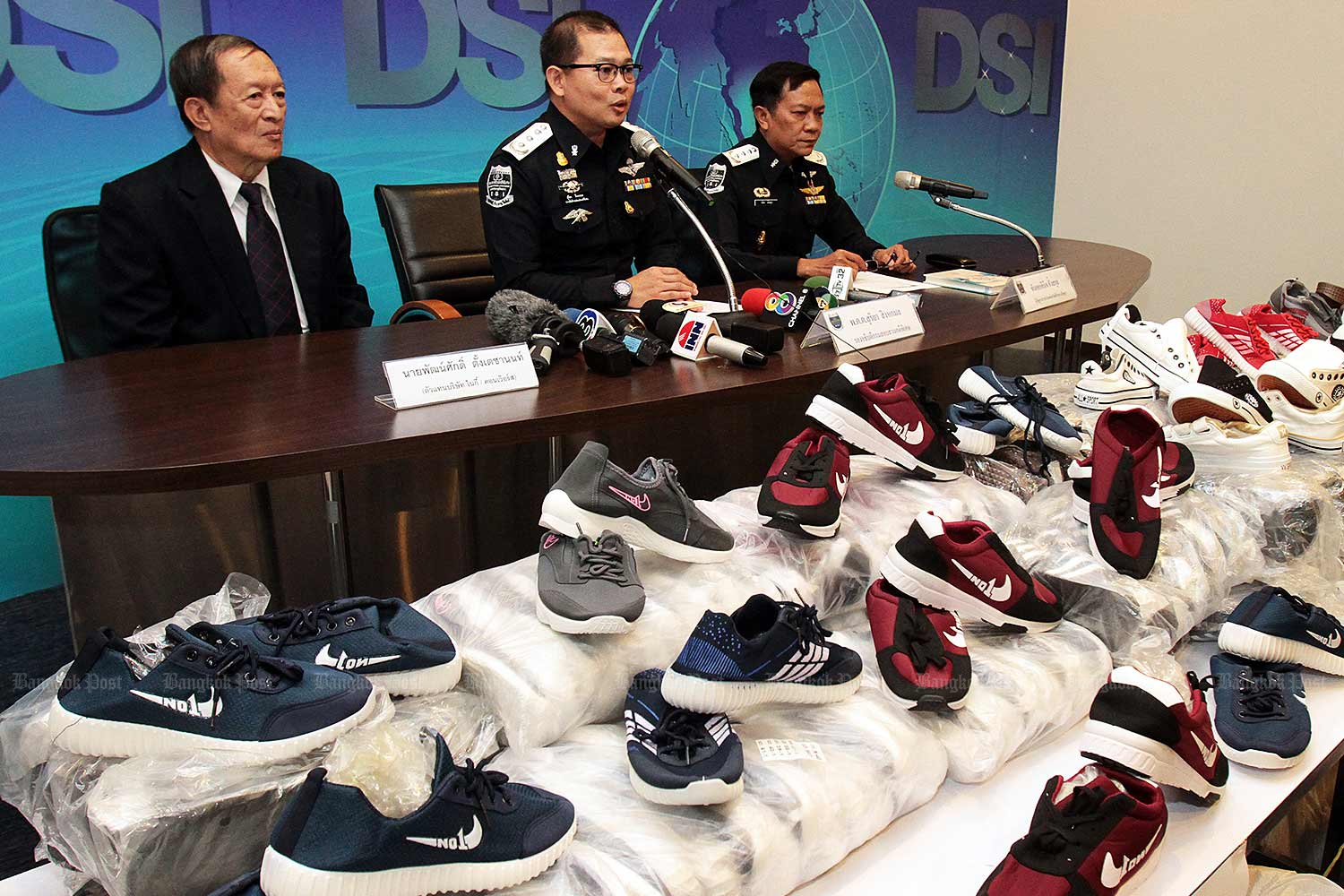
Customs spots June surge in smuggled goods.
The trade value of brand-name products smuggled into Thailand surged in June, partly motivated by bigger profits from the firmer baht, says a Customs Department official.
The department last month saw 45 cases of smuggled brand-name goods worth 42.9 million baht in total, more than doubling the average monthly haul of 20 million baht in the past year, said Tada Choomchaiyo, director of the enforcement division.
The stronger baht resulted in a higher profit from importing goods such as luxury watches and bags for domestic sale, Mr Tada said.
Take Patek Philippe watches as an example. A watch imported into Thailand is subject to a 5% duty plus a 7% value-added tax (VAT), constituting a tax amount of almost 100,000 baht, based on a list price of 800,000 baht. A luxury bag is subject to 20% import duty plus the 7% VAT, Mr Tada said.
Unlike in the past, brand-name products are being smuggled by gangs. The Customs Department has a watch list of 100 suspected smugglers.
https://www.bangkokpost.com/business/1710283/customs-spots-june-surge-in-smuggled-goods
Lear MoreBengaluru: 10L smuggled foreign cigarettes worth Rs 2cr seized
BENGALURU: Customs officials have seized over 10 lakh cigarettes worth Rs 2 crore that was smuggled from Bangladesh and Myanmar to Bengaluru. The cigarettes were stored in three godowns in the city market. A Bengaluru resident has been taken into custody.
M Ramana Reddy, additional commissioner, city customs commissionerate, said a man who was trading foreign cigarettes was detained on June 8 and three godowns in the city market area were raided on June 28. More than 16 brands of international cigarettes worth Rs 2 crore were found there. These cigarettes were illegally sold in pubs, bars and other high-end outlets.
“There was intelligence input about cigarettes being smuggled from Bangladesh to Bengaluru via Kolkata by train. Officials intercepted the goods train in Yeshwanthpur and the City railway station and seized a portion of the consignment. While the transporters escaped, the officials got whereabouts of the recipient of the consignment and picked him up for questioning. He took the officials to the location where he transported the goods,” an official said.
Officials said as there’s a huge demand for imported cigarettes in Bengaluru, two consignments used to arrive by train every week. This was helping traders evade taxes. The cigarette packets do not carry pictorial health warnings as required under the Cigarettes and Other Tobacco Products (Packaging and Labelling) Amendment Rules-2017.
Lear MoreCapacity Building Programme for Police Officers on Prevention of Counterfeiting, Smuggling and Piracy, New Delhi
05/07/2019| New Delhi
Over some time now, trade in counterfeit, smuggled and pirated goods has developed into a substantial threat to the economy of our country and pose serious safety and security hazards to the society at large. Different government agencies are involved at various stages in tackling such crimes, right from detection, investigation, prosecution and prevention of these offences, often including the recovery of the proceeds of crime. The police department is the primary law enforcement agency in our country. With low barriers to market entry and infiltration, the police play a very significant role in ensuring the protection of right owners. There are adequate laws available but enforcement of the laws makes the role of police officers even more important in the fight against counterfeiters and smugglers.
FICCI CASCADE has been organizing capacity building programs for police officers in various states, focusing on economic offences such as counterfeiting, piracy and smuggling, equipping the officers to understand the laws and take requisite action against counterfeiters and smugglers. In pursuance of its agenda of sensitizing police officers on this issue, FICCI CASCADE organized a series of capacity building programmes for police officers on ‘Prevention of Counterfeiting, Smuggling and Piracy’ during June-July 2019 in Vizianagaram, Mysore, Chennai, Meghalaya and culminated it in New Delhi on 5th July, 2019.
A key objective of the program was to build capacities of the officials on seriousness of the socio-economic impact of counterfeited and smuggled goods and the practical aspects that has to be kept in mind by the officers while investigation of economic crimes. Over 250 police officers of the rank SIs, ASIs, DSPs, ACPs and DCPs participated in the training programme at Barakhamba Police Station, New Delhi.
Mr. Deep Chand, Former Special Commissioner of Police, New Delhi and Advisor, FICCI CASCADE, in his address informed about FICCI CASCADE’s mandate of capacity building of law enforcement agencies including Judges, Police and Customs Officers, and how CASCADE had been working extensively and intensively in this area nationally, organizing training programmes and seminars along with continuous interactions with the law enforcement authorities to emphasize on the importance of increased awareness on the gravity of the problem.
Mr. Chand correlated smuggling and counterfeiting activity with the security challenge in different environments around the world. He cited various instances where illicit trade in goods is being increasingly used to fund anti-social and terrorist activities. Mr. Chand also urged that need of the hour today was tangible actions to increase enforcement, and to impose increased punishments. This is imperative to reassure legitimate business owners and consumers that the government is serious about protecting right owners, and this will, in turn, encourage greater support for government policies.
While deliberating on the topic, some of the challenges for police in addressing such crimes that were highlighted are:
• Capacity in terms of skill, infrastructure and technology amongst the law enforcement is not adequate.
• Since the police officers are fully occupied with the investigation of property offences and crime they have little exposure to economic offences and special provisions contained in the enforcement of the IP laws. Hence, it is not a priority for police officers.
• Lack of knowledge of legal provisions related to IP laws. This is necessary for efficient investigation and successful prosecution.
• Majority of the Investigation Officers do not have requisite training and are not comfortable with the investigation that involves such offences.
Mr. Suvashis Choudhary, IPS, Additional Commissioner of Police, Economic Offence Wing, Delhi Police, chief guest at the programme said that, ‘”The fundamental work of the police is to safeguard life and property of the public, and to maintain law and order in the society. Counterfeiting and smuggling activities is a wire joint which encourages organized crimes. Traditional crimes like murder and terrorism are usually given importance however, economic crimes like counterfeiting and smuggling which affect our daily lives are not given due priority’. Mr. Choudhary thanked FICCI CASCADE for its initiative of sensitizing police officers on this pertinent issue and urged the industry to come forward and work collaboratively with the police to address this menace”.
The training session was also addressed by eminent lawyers, academicians and industry discussing on a wide range of concerns on the subject with the participating police officials. The programmes were supported by United States Patents and Trademark Office (USPTO). Mr. Timothy K. Browning, Attorney-Advisor, USPTO, Washington emphasized on the creation of a National Coordination Center to enforce IP laws and resolve issues arising out of this menace. He also said ‘‘USPTO stands for promoting strong and effective IP laws globally and we have collaborated with FICCI CASCADE to exchange best practices and new methods to counter crimes such as counterfeiting, smuggling and piracy.”
All speakers unanimously agreed on the fact that the existence and operation of smuggling, counterfeiting and piracy is not only broad in scope and large in value but is draining the global economy, causing losses to both industry & government, and most importantly adversely impacting the health and safety of the consumers. There is an urgent need to create communication, coordination and close cooperation amongst various government agencies, law enforcement officials and private sector to curb the growing scourge.
Lear More




